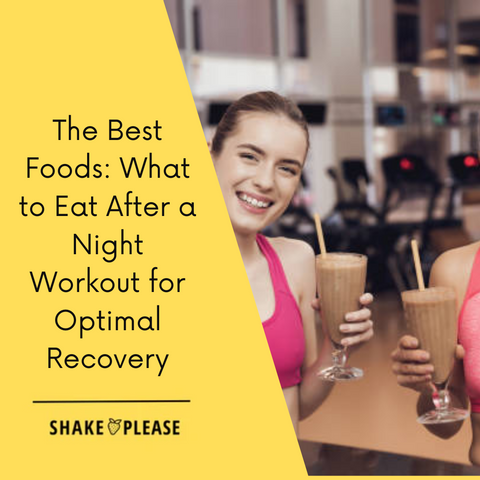Introduction to Post-Workout Nutrition
Post-workout nutrition is a critical component of any fitness routine, especially following an evening workout when your body needs the right foods and essential nutrients to recover and prepare for rest. After a strenuous workout, your muscles are depleted of glycogen, and muscle fibers experience micro-tears that require repair. Consuming the right nutrients shortly after your post workout snack helps replenish energy stores, kick-start muscle protein synthesis, and reduce inflammation and muscle soreness. A balanced post-workout meal not only supports physical recovery but also plays a role in improving sleep quality, which is essential for overall health and muscle growth. Proper nutrition after a night workout, particularly with whey protein, can also aid in weight loss by optimizing metabolism and preserving lean muscle mass.
Key points to consider for effective post-workout nutrition, according to the sports nutrition position stand, include:
-
Replenishing Glycogen Stores: Consuming complex carbohydrates helps restore the energy your muscles used during exercise.
-
Supporting Muscle Repair and Growth: Protein intake provides the amino acids necessary for muscle protein synthesis and tissue repair.
-
Reducing Muscle Soreness: Nutrients with anti-inflammatory properties can help minimize delayed onset muscle soreness (DOMS).
-
Balancing Macronutrients: Including healthy fats alongside protein and carbs supports hormone production and sustained energy release.
-
Enhancing Sleep Quality: Proper nutrition can promote better rest, which is crucial for recovery and muscle growth.
-
Optimizing Body Composition: Post-workout meals can help reduce body fat while preserving or increasing muscle mass.
By focusing on these nutritional strategies after nighttime exercise , you can maximize the benefits of your nighttime workouts and support your fitness goals more effectively by incorporating a post workout meal .
Should You Eat Protein Before or After Workout for Optimal Results?
Importance of Protein for Muscle Repair
Protein is crucial for repairing and building muscle mass and tissue after a workout, which is vital for enhancing muscle strength supporting recovery and growth.
-
Protein provides essential amino acids needed for muscle protein synthesis and tissue repair.
-
Consuming protein post-workout helps reduce muscle soreness and promotes muscle growth.
-
Aim to consume 20-40 grams of protein within two hours after exercise for optimal recovery.
-
Good protein sources include lean meats, fish, eggs, dairy, legumes, and tofu.
-
Whey and casein proteins are excellent for post-workout shakes due to their rich amino acid profiles and digestibility.
Including adequate complete protein such as healthy snacks like whey protein, which contains essential amino acids, in your post-workout nutrition supports effective muscle repair and enhances fitness results.
Healthy Foods for Recovery
Consuming the right foods and healthy snacks after a workout is essential to replenish energy, support muscle repair, and promote overall recovery.
-
Complex carbohydrates such as whole grains, fruits, and vegetables help replenish glycogen stores and provide sustained energy for recovery.
-
Healthy fats from sources like nuts, seeds, and avocados support muscle growth and provide long-lasting energy.
-
Lean protein sources including chicken, turkey, and fish are vital for muscle repair and growth.
-
Dairy products like Greek yogurt and cottage cheese offer high-quality protein that aids muscle recovery.
-
Antioxidant-rich foods such as berries and leafy greens help reduce muscle soreness and inflammation, promoting faster recovery.
Incorporating these nutrient-dense foods into your post-workout meals can enhance recovery and support your post exercise protein intake goals.
Macronutrients for Recovery
A balanced intake of macronutrients after a workout is key to effective muscle recovery and growth.
-
Carbohydrates are vital for replenishing glycogen stores depleted during exercise, providing energy for recovery.
-
Protein is essential for muscle repair and growth, supporting muscle protein synthesis when consumed in adequate amounts post-workout.
-
Healthy fats offer sustained energy, help reduce inflammation, and support muscle growth and overall recovery.
-
Consuming a balanced combination of carbohydrates, protein, and healthy fats after exercise optimizes muscle repair and development.
-
Staying hydrated with water and electrolyte-rich beverages is crucial to support recovery processes and maintain muscle function.
Focusing on these macronutrients and hydration helps maximize the benefits of your post-workout nutrition.
Timing and Meal Planning
To optimize muscle recovery and growth, it is important to consume a protein shake or a well-balanced post workout meal or snack within two hours after exercising, ensuring proper post exercise protein intake . Planning your meals and snacks ahead of time can help ensure you get the right balance of macronutrients needed to support recovery and muscle development. Using tools like a food diary or meal planning app can be beneficial for tracking your intake and maintaining consistent nutrition. It’s equally important to listen to your body and adjust your nutrition plan based on how you feel and your individual needs. Experimenting with different foods and meal timing will help you discover what works best for your unique fitness goals and lifestyle, allowing you to maximize the benefits of your workouts.
Staying Hydrated and Focused on Healthy Foods
Maintaining proper hydration and a nutrient-rich diet, in line with sports nutrition principles, is fundamental for effective muscle recovery, optimal performance, and long-term muscular adaptations in fitness success.
-
Drinking sufficient water and electrolyte-rich beverages after workouts is critical to replenish fluids lost through sweat, support muscle function, and prevent dehydration, which can impair recovery and performance. Electrolytes like sodium, potassium, and magnesium help maintain fluid balance and nerve function essential for muscle contractions.
-
A well-rounded diet that includes lean protein sources (such as chicken, fish, tofu, and legumes), complex carbohydrates (like whole grains, fruits, and vegetables), and healthy fats (from nuts, seeds, avocados, and olive oil) provides the necessary macronutrients to repair muscle tissue, restore glycogen stores, and reduce inflammation. This balanced intake supports sustained energy levels and muscle growth.
-
It is important to avoid sugary beverages and foods high in saturated and trans fats, as these can promote inflammation, hinder muscle repair, and contribute to unwanted fat gain. Excess sugar can also lead to energy crashes and negatively affect insulin sensitivity, which is crucial for nutrient uptake in muscles.
-
Collaborating with a sports dietitian or nutritionist can be highly beneficial for developing a personalized nutrition plan that aligns with your specific fitness goals, dietary preferences, and any medical considerations. Professional guidance ensures you meet your nutrient needs effectively and safely.
-
Consistently focusing on hydration and nutrient-dense foods reinforces your workout efforts, enhances recovery, and supports overall health. Staying disciplined with these habits is key to maximizing the results of your training and achieving long-term fitness success.
By prioritizing hydration and a balanced diet, you create a strong foundation for muscle recovery, improved performance, and sustained progress toward your fitness goals.
Delicious Workout Smoothie Recipes to Energize Your Fitness Routine
Conclusion
Optimal recovery after a night workout hinges on thoughtful post-workout nutrition that replenishes energy, supports exercise metabolism repairs muscle tissue, and supports overall health. Prioritizing a balanced intake of protein, complex carbohydrates, including slowly digesting carbs and healthy fats within the critical recovery window helps maximize new muscle tissue growth, support weight loss, reduce soreness, and improve sleep quality while preventing muscle breakdown. Staying well-hydrated and focusing on nutrient-dense foods further enhances recovery and performance. Planning meals and listening to your body’s needs allow for personalized nutrition strategies that align with your fitness goals. By consistently applying these principles, you can accelerate recovery, boost your progress, and maintain long-term success in your fitness journey.






